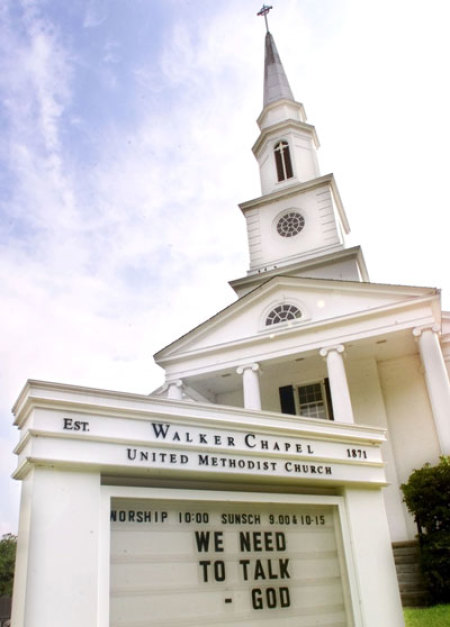Evangelism Using Death, Heaven, Hell Talk Don't Work on 'Unchurched' Americans, Survey Finds

Non-church-attending Americans are generally open to talking about faith but few wonder about life after death – which is the tactic many Christians are taught to begin conversations, a new LifeWay Research study commissioned by the Billy Graham Center for Evangelism at Wheaton College finds.
Nashville-based LifeWay Research published a study Thursday that examines the types of church activities that "unchurched" Americans are interested in as well as how open they are to talking about faith. By "unchurched" the researchers mean "those who have not attended a worship service in the last six months, outside of a holiday or special occasion like a wedding." Surprisingly, the survey found that more than half of Americans who don't go to church self-identify as Christians.
The online survey of 2,000 unchurched Americans finds that:
- about two-thirds (62 percent) would attend a meeting at a church about neighborhood safety;
- half would participate in a community service event (51 percent);
- nearly half would go to a concert (45 percent);
- nearly half would join a sports or fitness program (46 percent);
- nearly half would go to a neighborhood gathering (46 percent).
The survey also finds that 66 percent of respondents said they were either "unlikely" or "extremely unlikely" to attend a worship service if invited. Even more respondents, 74 percent, were "unlikely" or "extremely" to attend a "small group for people curious about God."
Why Is There Such an Aversion to Church?
Earlier this month, The Christian Post interviewed Preston Ulmer who started an unconventional group called "The Doubter's Club" in Denver-area coffee shops to engage skeptics and atheists with the Gospel. CP reached out to him for comments on this survey's findings, asking him what drives distaste for churches, particularly among young people.
"Millennials pride themselves on two big ideas: making social impact and genuine relationships," Ulmer said. He added, "and by genuine I literally mean no facade whatsoever."
"I believe the reason they are leaving the church is because both of these issues are not at the forefront of most American churches."
Ulmer further noted that the lack of community in many churches has only fed the individualism millennials are known for and that's why they enjoy conversing about spirituality.
"At first, things are talked about with a sense of certainty. After challenges, friendships with believers, and genuine relationships, they change their individual belief to line up with the truth. That is what I've seen, anyway."
Such would explain the findings that many are interested in church activities related to community connectedness.
The popular Alpha Course, which was hatched out of Holy Trinity-Brompton Anglican Church in London, and is sometimes described as "evangelism gone dialogue," is a ten-week Christianity 101 course built around a series of talks introducing curious people to the basics of the Gospel and is often conducted inside and outside the church.
CP asked John Wentz, ministry director and member of the Lead Team at Alpha USA, what drives distaste for the church such that so many (evidenced by the LifeWay survey) unchurched would not consider going. And what makes the Alpha approach different from traditional church settings?
"Alpha focuses on hospitality, on creating a safe place to explore faith, ask questions and have discussions," Wentz said in an email to CP, emphasizing that the premise is "no question is off limits, and no point of view is out of line."
"We want to encourage those attending Alpha to feel comfortable to ask questions and to have conversations that they may feel they can't have in other places," Wentz continued.
"We know that this doesn't take place in one conversation or even two. Having a real relationship where we can talk about the most important things in life takes time," he said.
A Conversation About Faith
Such an intentionally conversational approach to faith dovetails with perhaps the most interesting result the LifeWay study uncovered: Unchurched Americans are not put off by their Christian friends talking to them about matters of faith.
Close to half (47 percent) of respondents said that they discuss religion freely if the topic comes up. And about a third (31 percent) say they listen without responding, while 11 percent change the subject.
"Unchurched Americans aren't hostile to faith," says LifeWay Executive Director Scott McConnell in a statement, "they just don't think church is for them."
But Christians should be prepared to change their evangelism approach as many unchurched Americans say they never (43 percent) or are not sure of the last time the question came to mind (20 percent) of "If I were to die today, do I know for sure that I would go to heaven?"
McConnell observes, "If the only benefit of being a Christian is that you get to go to heaven, most unchurched people don't care. It can't be the only way of talking about faith."
The LifeWay Research/Billy Graham Center for Evangelism at Wheaton College survey was conducted May 23 to June 1, 2016, with a sample of 2,000 surveys with a +/- 2.7 percent margin of error.





















